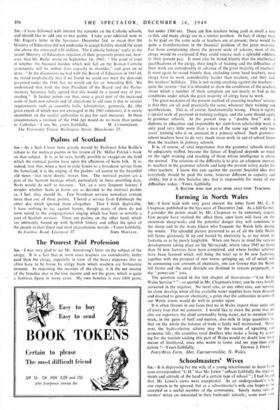The Poorest Paid Profession
SIR,-1 was very glad to see Mr. Armstrong's letter on the subject of the clergy. It is a fact that in most cases teachers arc considerably better paid than the clergy, especially in view of the heavy expenses that so often have to be borne by clergy from which teachers are fortunately immune. In reckoning the incomes of the clergy, it is the net income of the benefice that is the true income and not the gross, which is quite a fictitious figure in many cases. My own benefice is over £400 gross,
but under f300 net. There are few teachers being paid as small a sum as this, and many clergy are in a similar position. In fact, if clergy were to be paid on the same scale as teachers are at present, there would he quite a transformation in the financial position of the great majority. Far from complaining about the present scale of salaries, most of the clergy would be overjoyed if they could receive such a splendid addition to their present pay. It must also be stated bluntly that the intellectual qualifications of the clergy, their length of training and the difficulties of their work are considerably in advance of the great majority of teachers', It must again be slated bluntly that, excluding some head teachers, most clergy have to work considerably harder than teachers, and they lack the teachers' holidays. This is not saying anything against the teachers— quite the reverse—but it is intended to show the conditions of the teachers about which a number of them complain arc not nearly so bad as the conditions under which the great majority of clergy have to work.
The great weakness of the present method of assessing teachers' salaries is that they are all paid practically the same, whatever their training and qualifications. This is, of course, fundamentally wrong. There is rightly a special scale of payment in training colleges, and the same should apply to grammar schools. At the present time a "double first" with a diploma in education and responsible for sixth-form scholarship work is only paid very little more than a man of the same age with only two years' training who is an assistant in a primary school. Such grammar- school teachers have to do very much more work in out-of-school hours than the teachers in primary schools.
It is, of course, of vital importance that the grammar schools should be adequately staffed, because the future of England depends so much on the right training and teaching of those whose intelligence is above the normal. The solution of the difficulty is to give an adequate increase to teachers in the grammar schools and keep the present salary scales for other teachers. I know this cuts against the current Socialist idea that everybody should be paid the same, however different in capacity and ability, but it is this Socialist idea that is responsible for many of our difficulties today.—Yours faithfully, A RECTOR WHO HAS ALSO DONE FULL-II ME TEACHING.


































 Previous page
Previous page